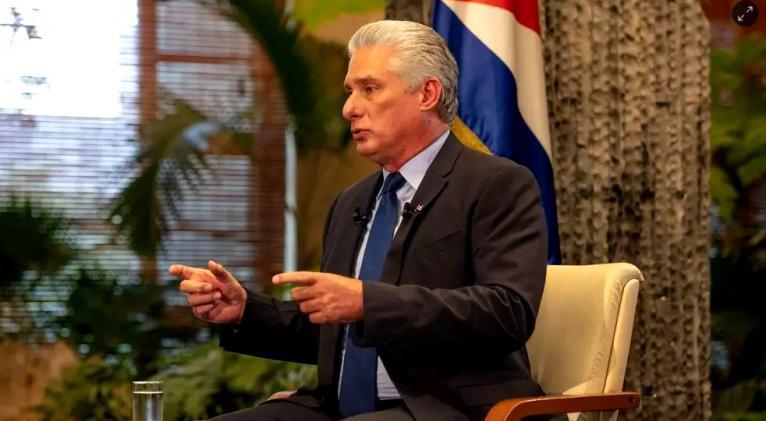Díaz-Canel: “Biden government opted to remain faithful to the aggressive approach championed by Trump” (II)
especiales

Cuba, a nation of slightly over 11 million inhabitants, is always making headlines. However, we do not usually contact their leaders. Miguel Díaz-Canel, the first President born after the Cuban Revolution, granted an interview to *El Público*, his first interview ever to a Spanish media since he came to power. He talked about the island’s current affairs in an interview arranged in Havana, which was then answered in writing.
The Cuban president refers to the conflict underlying behind the accusation of Cuba sponsoring terrorism, denounces the similarity of the anti-Cuban policy of Biden and Trump, explains the country’s economic situation post-pandemic era and analyzes its recent meetings with Vladimir Putin and Xi Jinping.
You have recently met with Russian President Vladimir Putin and Chinese President Xi Jinping. What is your assessment of those meetings and what perception have you had about the role of these two powers in the world crisis over the war in Ukraine?
I have been able to engage in deep and warm exchanges with Comrade Xi Jinping at different times. The last of them was last November 2022, after the celebration of the XX Congress of the Communist Party of China and his re-election as General Secretary of the Party.
Comrade Xi is a sincere friend of the Cuban people and a statesman with solid principles, who has known how to place integral development, institutions, legality and the people at the center of his efforts.
I must highlight his personal attention and the priority he gives to relations with Cuba and his recognition of the role played by the Cuban historical leadership, as the makers of the endearing friendship between Cuba and China.
We also recognize the diplomatic efforts that China and, in particular, the Secretary General and President Xi Jinping have been deploying in favor of finding a lasting and negotiated political solution to the conflict in Ukraine.
We agree on the need for a vision of cooperative and sustainable security for all nations, based on respect for the Charter of the United Nations, contrary to unilateralism and, in particular, unilateral sanctions.
I have also had extensive exchanges with President Vladimir Putin, marked by camaraderie and the common will to strengthen in all areas the relations that distinguish two sister nations such as Cuba and Russia.
The atmosphere of frank cordiality of our meetings with a sincere friend, also proven by facts, is the result of the traditional friendship founded by Commander in Chief Fidel Castro to whom a monument was dedicated in Moscow, which we unveiled during my most recent visit to Russia in November 2022.
It was thrilling to hear, back then, the admiration and respect that President Putin professes for the historic leader of the Cuban Revolution, of whom he said was a man who inspires and guides millions of people on that other side of the world.
Friendly, but also strategic, relationship is the one we develop with Russia, based on historical ties of friendship and brotherhood, forged since the time of the Soviet Union with feelings of respect, affection, agreement on political issues and a potential for developing economic-commercial, financial, scientific-technical ties, among others, that we must strengthen.
We reject the progressive expansion of NATO towards Russia's borders, which has led to a scenario with implications of unpredictable scope. As a country that defends International Law and is committed to the Charter of the United Nations, which will always defend peace, we condemn all the sanctions that are applied to the Russian Federation, as a method of coercion.
We advocate a diplomatic and realistic solution that guarantees the security and sovereignty of all and addresses legitimate humanitarian concerns.
From China and Russia, we have only received unconditional solidarity and cooperation. China and Russia are friends. And with them, we share the defense of multilateralism, which is the best guarantee of peace.
The European governments are attuned to the US regarding the war in Ukraine. I do not know if you have the same perception regarding Cuba. Do you believe that the European Union and the Spanish government in particular are having an autonomous and sovereign policy in their relations towards Cuba, or are they following the US instructions? Do you miss any measure of collaboration with Cuba from the EU or Spain?
Cuba's relations with the European Union have been governed since 2017 by a Political Dialogue and Cooperation Agreement (ADPC) between Cuba, the EU and its 27 Member States based on the principles of reciprocity, equality and respect. This has allowed to advance both in our political ties through dialogue mechanisms, included in the ADPC, and cooperation, which have a significant impact on the country's economic development.
We have moved towards a more mature relationship that favors a broad exchange within the framework of a diverse agenda of bilateral and multilateral issues, including those where there are differences. As evidenced in the Third Cuba-EU Joint Council, held on May 26, 2023, for which the High Representative, Josep Borrell, visited us. There is a will on both sides to continue building better relations between Cuba and the European Union in mutual benefit.
We appreciate the support of the European Union as a whole for the resolution that Cuba presents annually in the United Nations General Assembly against the US blockade. The extraterritorial nature of this policy has among its main targets European companies and entities, which is why we urge the EU to apply its regulations to protect its citizens from the effects of unilateral coercive measures that interfere in the normal development of bilateral relations.
The European Union has been clear in its position in favor of removing Cuba from the list of State sponsors of terrorism drawn up by the United States Government, as part of its policy of maximum pressure on Cuba.
In the special case of Spain, there are historical relations between the two countries, based on mutual respect, cultural and family ties. Bilateral relations turned 121 years old on June 21. Spain continues to be one of Cuba's main economic partners globally and within the EU in particular.
Translated by Sergio A. Paneque Díaz / CubaSí Translation Staff














Add new comment